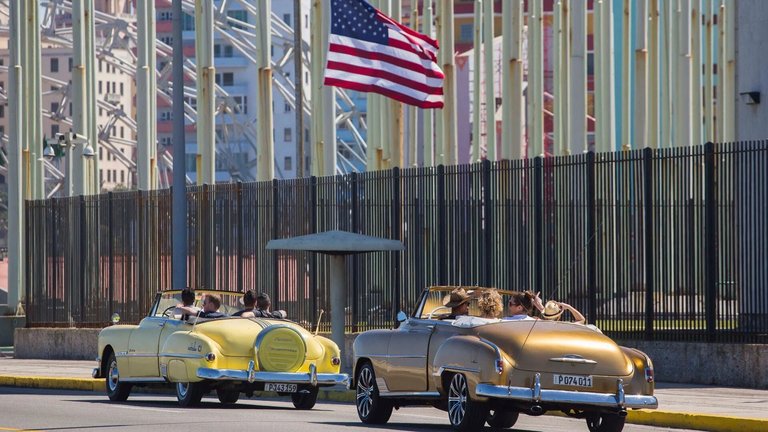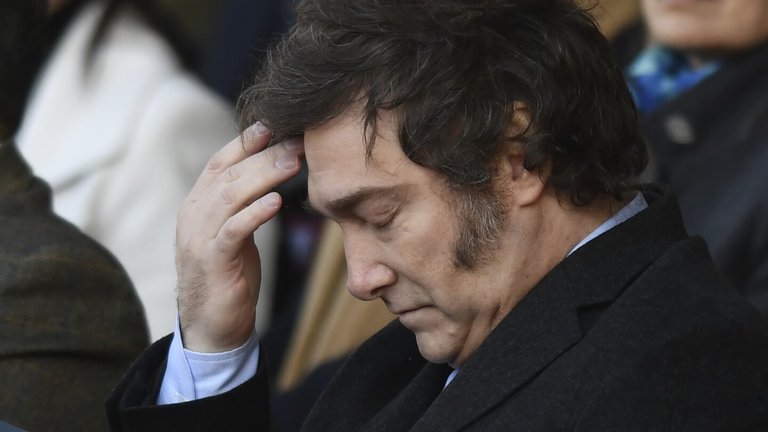
Cuba: an update
As stated in this Reuters dispatch, the chronic problems faced by the island, including long blackouts and shortages of food and other basic necessities, have been compounded by the collapse of the water supply infrastructure. In the case of this somehow new crisis it is happening the same as with the energy supply: the interruption of the service is the result of a decrepit network, broken everywhere, but also of the shortage of fuels. Foreign currency is scarce due to export defaults, general mismanagement of the economy, and the blunt impact of the US sanctions regime, which blocks or scares away potential investors. Venezuela, China, Russia, and Mexico are allies with the capacity to help the island weather the storm, but for a variety of reasons—including Havana's bureaucratic debts—no bilateral or multilateral effort in this regard is yielding as much and as quickly as needed.
The Cubans continue to leave the country in significant proportions, mainly to the United States. Between May and June of this year, Cuba was among the four countries with the most migrants crossing the U.S. southwest border (by the way, one might think that a potential Democratic administration would be preferable to the return of Donald Trump, but Kamala Harris will not make any big foreign policy moves in her first term). The Cuban state has lost more and more of its share in the satisfaction of the most urgent social needs, starting from its inability to sustain a basic monthly food basket that constituted an important source of consumption for all Cubans. This Friday, it was learned that a unit of bread that each citizen receives daily—at a highly subsidized price—will see its grammage reduced by 25% in order to stabilize its availability, in view of the low levels of wheat flour inventory. The product has been distributed irregularly for a long time.
 Source
SourceIn this context, the private sector has become a critical supplier, but its prices are very far from the possibilities of the common worker, let alone retirees. In this sense, the Cuban government lacks what in countries such as Argentina is known as “political waist”, since it has been reluctant to seek consensus with this sector when it comes to outlining certain policies related to monetary circulation, price formation and taxes. In a speech given last July, the Cuban president made it clear that the private sector is still thought of as an opponent of state enterprise, and certainly will be (more so) as long as government rhetoric, and the measures to be adopted, suggest it, or mean it. Instead of this tendency, the channeling of fiscal and other benefits to those entrepreneurs offering services within the reach of the majority of the population should be promoted.
Argentina
A lot of movement there, where Javier Milei announced that he will veto a legislation approved yesterday in the Senate, financing the depressed coffers of public universities. The Pink House argues that the senators don't identify the source of financing, while the government policy is not issuing any money. The ultra-right-wing leader has already vetoed a legislation that extended financial protection to retirees under, the above premise. If this projected veto becomes a reality, strong demonstrations are expected to be carried out by the powerful university sector, which has a great convening power. The head of Balcarce 50 also suffered a hard setback yesterday in the Senate with the rejection of a presidential decree activating discretionary funds in favor of the intelligence agency.
There is no money for education, but the government of La Libertad Avanza says instead that it is urgent to increase defense spending to protect the country against potential Iranian attacks, a nonsense. Never before have both houses of Congress returned a presidential decree of this kind, but neither has someone like Javier Milei—for better or worse—sat in the Rivadavia's armchair. Finally there, the state airline fired three pilots who refused to fly for returning chartered planes, in the midst of a union strike demanding a wage increase (the government has its sights set on privatizing the company). Some 320 flights were cancelled, affecting more than 37,000 passengers and representing a loss for the company of around US$2.5 million.
 Source
SourceBREAKING on Brazil, X/Starlink
BREAKING: Brazil's Supreme Court Justice Alexandre de Moraes decided to lift blockages previously imposed on Starlink and X accounts after ordering the transfer of $3.31 million from the accounts to the country's national coffers https://t.co/QNk6Dxxd6n pic.twitter.com/XO6UCJb77e
— Reuters Legal (@ReutersLegal) September 13, 2024
Trump mixes Venezuelans in his Ohio anti-immigrant saga. Or was that a mistake trying to make a reference to Haitians?
Trump: We will do large deportations from Springfield, Ohio. Large deportations. We're going to get these people out. We’re bringing them back to Venezuela pic.twitter.com/41CdKtcmwq
— Acyn (@Acyn) September 13, 2024
Local officials are working with the FBI to trace the origins of the threats, the mayor saidhttps://t.co/qCvDatozhg
— TIME (@TIME) September 13, 2024
The quick regional round-up
The Belekou, Nan Boston and Simon-Pelé gangs got into a gunfight last Wednesday over a referee's decision in a soccer match in Port-au-Prince, the capital of Haiti. An important asset of the Simon-Pelé gang is reported to have been killed, and two days after the events the shooting continues in Cité Soleil, the violence-torn community. There is talk of “many people killed”, but there is still no official or independent toll. A score of Jamaican policemen joined the Kenyan troops who are trying to repel the advance of the gangs and bring some peace to this broken nation.
The Mexican president has asked for “a minimum of responsibility” from the two factions of the Sinaloa cartel that have almost paralyzed the city of Culiacán, in a sign of the inability of the security forces to guarantee citizen rights in certain areas. “They have to look for other ways that do not harm innocent people, [without] confronting each other, that there is no loss of life”, AMLO demanded. Ismael “El Mayo” Zambada, one of the founders of the cartel, pleaded not guilty Friday in New York to all charges against him. His allies are at odds with followers of “Los Chapitos,” the faction led by the sons of “El Chapo” Guzmán. The fighting has left at least 15 dead, which for AMLO, who always relativizes violence, only represents that “there have been some problems”.
“The director in charge of the Guayas N°1 Male Penitentiary Center, María Daniela Icaza, died victim of an armed attack on the road to Daule”, the government office managing the Ecuadorian penitentiary system reported Thursday. Daniela Icaza is the second prison director killed in September, and the third in six months. She was deputy director of Ecuador's most dangerous prison—the so-called “Penitenciaría del Litoral” in bloody Guayaquil—, which is part of a complex made up of four other prisons. Violence continues unabated in Ecuador despite the deployment of the Armed Forces in the streets.
And this is all for our report today. I have referenced the sources dynamically in the text, and remember you can learn how and where to follow the LATAM trail news by reading my work here. Have a nice day.

